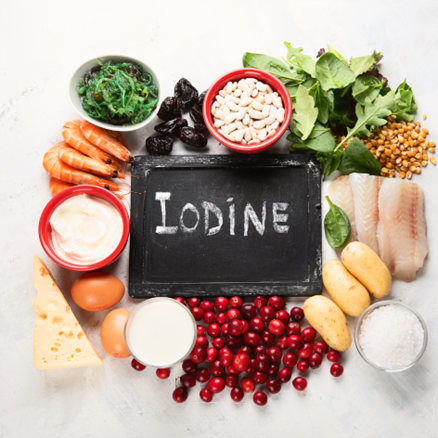Thyroid Health Unlocked: Iodine’s Crucial Role
Thyroid Health Unlocked: Iodine's Crucial Role
Byline Aubrey Knickerbocker, Dietetic Intern at Bastyr University
Wondering why iodine is a game-changer for your health? In this blog post, I’ll give you the scoop on iodine’s vital role in keeping your thyroid in check. Ready to decode the iodine mystery? Let’s dive in!
You can achieve better health if you understand the role of iodine in thyroid function. Iodine is a trace mineral found in some foods. It plays an essential role in making thyroid hormones, which are necessary for your body to work every day. Without enough iodine, your energy levels and metabolism can suffer.
What is your thyroid, and what does it do?
The thyroid is a small, butterfly-shaped gland in your neck. It works like a control center, keeping your body’s functions in balance. This includes things like controlling your heart rate and ensuring you have enough energy for your daily activities.
What are the consequences of too much or too little iodine?

Having too much or too little iodine can cause serious health problems, affecting the thyroid’s delicate balance. The average daily recommended amount of iodine for an adult is 150 micrograms. Excess iodine can make your thyroid work too fast, called hyperthyroidism. This can lead to problems like difficulty concentrating and feeling restless. On the other hand, not having enough iodine can make your thyroid slow down. This can make you feel tired and gain weight. This slowing down is called hypothyroidism. Striking this balance ensures your thyroid functions properly, supporting your body’s daily rhythm.
Where can I get iodine?
Iodine is found in many foods. Dairy products like milk and yogurt contain iodine. Eggs are another source of this important mineral. Surprisingly, even a simple potato with its peel provides a small amount of iodine. Seaweed and sea vegetables, such as nori or kelp, are also natural sources of iodine. In the United States, most people get iodine through iodized salt. You can meet your daily needs with half of a teaspoon of iodized salt.
What’s the deal with iodized salt?
Iodized salt takes the spotlight as the primary source of iodine in the diet. Iodized salt is simply salt with added iodine. Iodine was added to salt at the end of the 19th century. During this time, many Americans in the Midwest were suffering from goiter. Goiters are a thyroid condition linked to iodine deficiency. Adding iodine to salt was cheap and effective to remedy this health problem. To determine if salt is iodized, you can check the product packaging. Iodized salt typically has “iodized” or “contains iodine” mentioned on the label. Look for these terms in the ingredient list or in a specific section that indicates the salt’s features.
Are all salts the same?
Here’s the catch—not all salts are equal. Specialty salts do not contain iodine. These include sea salt, kosher salt, Himalayan salt, and fleur de sel. Also, processed foods, such as canned soup, may not contain iodized salt. If processed foods make frequent appearances on your plate, ensure that you are using iodized salt at home.
Iodine’s role in your health is crucial. To keep your thyroid healthy, it’s all about making smart choices. Knowing where your iodine comes from, whether it’s iodized salt or other foods, helps you keep your thyroid in balance. If you have questions about iodine and your thyroid, you can call the Bastyr Center for Natural Health at (206) 834-4100. You can also request an appointment at https://bastyrclinics.org/seattle. They can provide personalized guidance. This will ensure that your path to thyroid health is well-informed and tailored to your unique needs.
About the Author:
Aubrey is a dedicated dietetic intern at Bastyr University. She is passionate about translating nutrition into practical, accessible advice. Aubrey’s work reflects her belief that everyone deserves access to nourishing and wholesome food options.
References:
- National Institutes of Health. Office of Dietary Supplements – Iodine. Nih.gov. Published 2017. https://ods.od.nih.gov/factsheets/Iodine-Consumer/
- Harvard T.H. Chan. Iodine. The Nutrition Source. Published October 19, 2021. https://www.hsph.harvard.edu/nutritionsource/iodine/ https://www.istockphoto.com/photo/healthy-food-containing-iodine-gm1213819035-352917345
